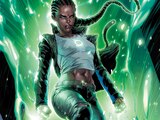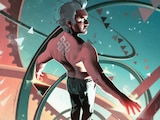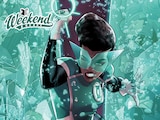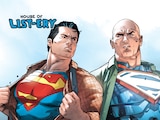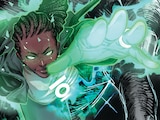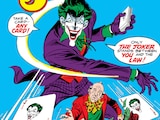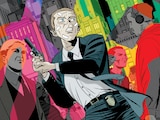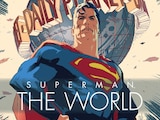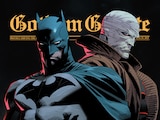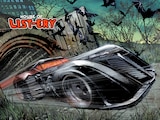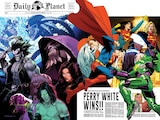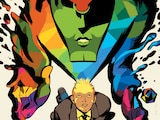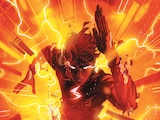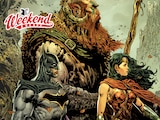I think what draws us into Batman is his humanity. Aside from his family’s wealth and the fictional apparatus he’s enclosed in, there’s not much that separates most of us from Batman. He’s made from the same fragile flesh as we are, and his grief is a familiar feeling. However, there’s another side to Batman’s humanity that most of us wouldn’t want to dwell on for too long: his capacity to fail. The story “Cheer” from Batman Urban Legends #1-6 beautifully spotlights the Dark Knight’s imperfection.
In case you haven’t read it, “Cheer” is a story by Chip Zdarsky, Eddy Barrows, Eber Ferreira and Marcus To about Red Hood and Batman’s rocky father-son relationship. It flips back and forth between Jason Todd’s childhood and time as Robin, to present day Gotham City, where Jason prowls the streets as Red Hood, investigating a new drug called cheerdrops. Red Hood’s cheerdrops mission quickly turns personal when he nearly orphans a child named Tyler, whose mother’s drug addiction and father’s neglect reminds Jason of his own childhood. When Batman arrives in response to Red Hood’s distress call, the two must reckon with Batman’s failures as Jason’s adoptive father.

As much as we all love Batman for how regular of a human he is, “Cheer” spotlights how Batman’s humanity makes him an imperfect parent. Batman holds himself to an extremely high standard, an inhuman level of discipline, and “Cheer” shows us how that behavior led him astray as a parent to Jason Todd. Because Batman was focused on understanding the weapons and methods of his foes, he failed to address the trauma that Jason experienced shortly before he became Robin. Seeing Jason’s Robin analyzing violent crime scenes with Batman shortly after he murdered his mother’s drug dealer is enough to make even the most stalwart supporter of Batman question his choices.
“Cheer” suggests that Batman’s biggest mistake as a parent was the forced isolation he placed between him and Jason. When the two were searching for Jason’s biological mother in Batman: A Death in the Family, Jason explains that, “Batman has always been a master of control. Every situation, everyone around him. He’s always known just how to handle everything. Until I came along. How could he be surprised? How could the great Batman not know? I wouldn’t listen to him. And he couldn’t hear me.”
In throwing away his own humanity to become the World’s Greatest Detective, Batman failed to account for how human beings need each other to make sense out of their lives.

In doing so, “Cheer” reveals a contradiction behind Batman. Bruce is quick to dehumanize himself, to push his body and mind past their limits in order to become the Bat, without realizing that the people closest to him need his empathy. Both Bruce and Jason suffered tremendously as children, but Bruce was never emotionally available enough to commiserate with Jason. Just like any of us, Batman can fail those he loves most in their greatest hour of need. Part of being human is not only experiencing pain, but imparting it, even if we don’t mean it.
When we talk about Batman’s humanity, we usually talk about his physical vulnerability. But “Cheer” is a reminder that Batman can also sometimes fail us. And what’s beautiful about Zdarsky, Barrows, Ferreira and To’s story is that it shows how we need to give Batman a little compassion in return. At the end of the story, after Red Hood rescues Batman from the effects of cheerdrops, Jason puts a supportive hand on Batman’s shoulder as his mentor fails to put into words what their whole ordeal has put him through. Though Bruce isn’t able to say anything more than “…I’m… I’m…,” Jason says, “I know… I know,” staying present with Bruce’s emotions and providing empathy. The scene illustrates how the weight of being Batman can’t be carried alone, and despite their turbulent relationship, Red Hood is uniquely suited to helping Batman carry it.

“Cheer” is a perfectly heartbreaking read because it forces us to come to terms with the shortcomings of our heroes. As much as we love seeing Batman become a force of nature and kick villains to the curb, we’re reminded of the personal costs that come with his mission. Bruce Wayne has not lived a normal life, but he still requires the same basic needs as any of us. Batman is always quick to give others grace, and it’s time we give him some too.
“Cheer” by Chip Zdarsky, Eddy Barrows, Eber Ferreira and Marcus To can be read in Batman: Urban Legends Vol. 1 as well as on DC UNIVERSE INFINITE.
Jules Chin Greene writes about comics, TV, games and film for DC.com, and his work can also be found at Nerdist, Popverse and Multiverse of Color. You can follow him on Twitter and Bluesky at @JulesChinGreene.
NOTE: The views and opinions expressed in this feature are solely those of Jules Chin Greene and do not necessarily reflect those of DC or Warner Bros. Discovery, nor should they be read as confirmation or denial of future DC plans.

